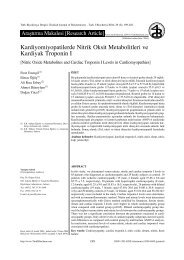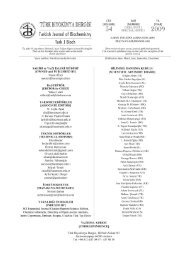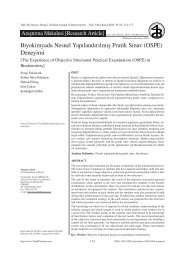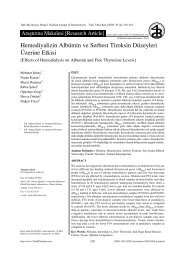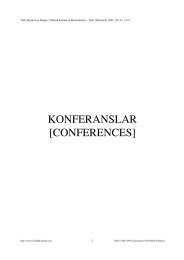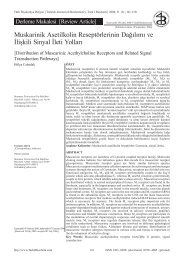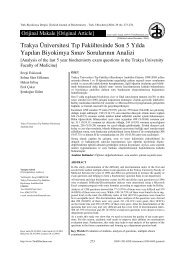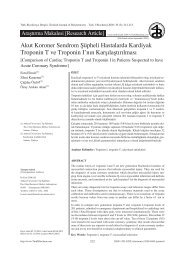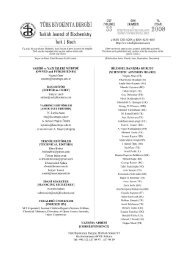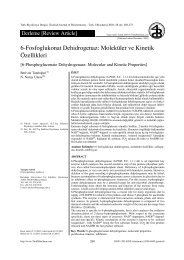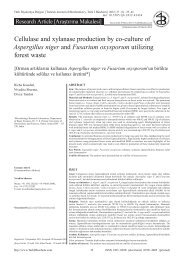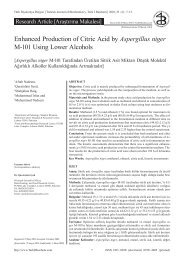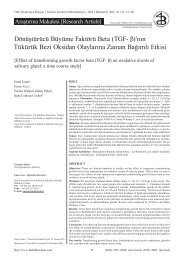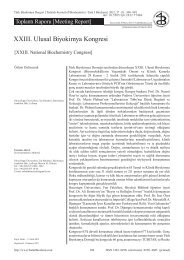24. Ulusal Biyokimya Kongresi - Türk Biyokimya Dergisi
24. Ulusal Biyokimya Kongresi - Türk Biyokimya Dergisi
24. Ulusal Biyokimya Kongresi - Türk Biyokimya Dergisi
- No tags were found...
Create successful ePaper yourself
Turn your PDF publications into a flip-book with our unique Google optimized e-Paper software.
XXIV. ULUSAL B‹YOK‹MYA KONGRES‹<br />
25 - 28 Eylül 2012<br />
Dedeman Otel - Konya<br />
<strong>24.</strong> <strong>Ulusal</strong> <strong>Biyokimya</strong> <strong>Kongresi</strong>, Konya [24 th National Biochemistry Congress, Konya / TURKEY]<br />
İÇİNDEKİLER<br />
DAVETLİ KONUŞMACI ÖZETLERİ<br />
BİLİMSEL MAKALENİN OKUNABİLİRLİĞİNİ ARTTIRMAK<br />
A. Kevser ÖZDEN-P‹ŞK‹N<br />
Hacettepe Üniversitesi Tıp Fakültesi Tıbbi <strong>Biyokimya</strong><br />
Bilimsel bir makaleyi yazmak gerçekten zor bir iştir, ancak bazan onu okumak<br />
daha da zor olabilir. Çoğumuz bazı makaleleri okurken zorlanacağımızı hissederiz.<br />
Bu hisse özetini okurken veya daha sonraki bölümlerde kapılabiliriz. Özeti<br />
okuyarak makalenin içeriği hakkında fikir edinmek zor ve özellikle vaktimiz az<br />
olduğunda can sıkıcı olabilir. Bunun başlıca nedeni ağırlığın girişe verilip material<br />
ve yöntem kısaca anlatılmış, amaç ve sonuçlara ise kısaca değinilmiş olmasıdır.<br />
Aslında, okuyucu daha çok sonuçlarla ilgileniyor, konu ile ilgili bilgileri ise zaten<br />
biliyordur. Diğer itici bir konu da özette çok fazla kısaltma kullanılmış olmasıdır.<br />
.<br />
Girişe doğru ilerlediğimizde once okuyucuyu çalışmanın amacına yönlendiren<br />
temel bilgilerin olması hoşa gitse de bütünleştirilmemiş ve aşırı bilgi can sıkıcı<br />
olabildiği gibi yazarın okuyucuyu çalışmanın önemine inandırmak için zorladığını<br />
da düşündürebilir. Materyal ve yöntemlerin de kaynaklar verilse de bir miktar<br />
açıklanması yarar sağlar.<br />
Sonuçlarda tablo ve şekillerin alışılmış şekilde sunulmasında yarar vardır.<br />
Karmaşık ve anlaşılması zor biçimlerde sunulan sonuçlar yorucu olup altyazıların<br />
yeterli olması okuyucunun sedece şekillere bakarak bir fikir edinmesini sağlar.<br />
Tartışma ise ilgisiz bilgiler içermemeli ve uygun kaynaklar verilerek sonuçlarla<br />
bağlantının iyi kurulmuş olması yarar sağlar. Fikirlerin belirli bir mantığa uygun<br />
biçimde yapılmış olması tartışmayı daha cazip ve akıcı hale getirir.<br />
Hepsinden önemlisi, makale yazım ve gramer hatalarından arındırılmış ve akıcı bir<br />
biçimde yazılmış olmalıdır. Uzun ve tekrarlar içeren cümlelerden kaçınılmalıdır.<br />
Kelime işlemcisi ve yazım kontrolünden yararlanmak gramer ve yazım hatalarını<br />
önlemek için gereklidir. Eğer işlemcinin yakalayamayacağı özel kelimeler yazar<br />
tarafından düzeltilmezse, sonraki sayıda düzeltme eklenmesine neden olmakta, bu<br />
da derginin saygınlığına gölge düşürmektedir. .<br />
Yazarlar her cümlenin bir öncekinin devamı olmasına dikkat etmesine önem<br />
vermelidirler. Cümleler arasındaki devamlılık makaleye uyumlu bir hava<br />
vermektedir. Makalenin yazımında kullanılan dil ne basit ne de fazla ağır<br />
olmamalıdır. Okuyucunun aklını karıştırmamak ve ivmeyi korumak için<br />
cümlelerin belirli bir bilgiye odaklanmış olması gerekir. Bu kural paragraflar,<br />
tümleç ve diğer ögeler için de geçerlidir. Okuyucunun ilgisi kaybetmemek için<br />
ifadelerde işlevsellik taşıyan uygun zaman kullanılmalıdır. Böylece okuyucunun<br />
IMPROVING THE READABILITY OF A SCIENTIFIC PAPER<br />
A. Kevser ÖZDEN-P‹ŞK‹N<br />
Hacettepe Üniversity Faculty of Medicine. Medical Biochemistry<br />
Writing a scientific paper is certainly a difficult task, however it is sometimes<br />
more difficult to read it. There are times that we have to force ourselves to follow<br />
a manuscript with profound concentration. Sometimes we get this unpleasant<br />
feeling as we take a glance at the abstract and sometimes it becomes more<br />
evident as we stroll through the later sections. Struggling to get an idea about<br />
the content of an article and especially the aim of the work from the abstract is<br />
quite a challenge especially when our time is limited. The main reasons for this<br />
is attaching the priority to introduction of the presented study without putting<br />
the aim forward and then briefly mentioning the materials, methods and result.<br />
Actually the reader is more concerned with the results and may be quite aware of<br />
the literature on the field. Another repulsive thing in an abstract is the presence of<br />
too many abbreviations.<br />
As we move to the introduction, it is at first nice to see some background<br />
information which prepares the reader for the aim of the present work or if one is<br />
familiar with the subject, it helps set our brains for concentration on the upcoming<br />
data. However, excessive knowledge gathered from the literature not put together<br />
properly may be boring and may make one loose his/her confidence on authors as<br />
they may be forcing us to believe that this work was a necessity.<br />
Materials and methods should contain sufficient information, despite the fact that<br />
methods are usually referred by references.<br />
Results presented in tables and figures must be presented in traditional format.<br />
Complicated formats may be tiresome and difficult to understand. Captions of<br />
these should also be informative and reader should be able to get a view of the<br />
work by first glancing at the tables and figures.<br />
Discussion must not contain irrelevant knowledge and connection between the<br />
results and the previous findings must be done properly by providing suitable<br />
references. Logical flow of ideas makes discussion more palatable and fluid.<br />
Above all, the article should not contain grammatical errors and should be<br />
written in a fluent style. Long and repetitive sentences must be avoided. Using<br />
word processor and spelling check is required in order to prevent grammatical<br />
and writing errors. If the errors due to specific words which the processor cannot<br />
detect are corrected by the author, problems arise as it needs to be declared in<br />
erratum within the next issue, and this in turn, effects the reliability of the journal.<br />
CONTENTS<br />
ABSTRACTS OF INVITED LECTURES<br />
Turk J Biochem, 2012; 37 (S1)<br />
http://www.TurkJBiochem.com



